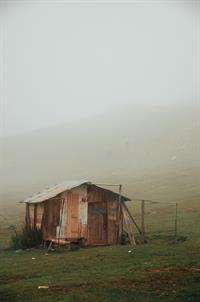
PUMPA - SMART LEARNING
எங்கள் ஆசிரியர்களுடன் 1-ஆன்-1 ஆலோசனை நேரத்தைப் பெறுங்கள். டாப்பர் ஆவதற்கு நாங்கள் பயிற்சி அளிப்போம்
Book Free Demo One evening, when Taro and his parents were sitting in a corner of their hut, a strong wind began to blow. It whistled through the cracks of the hut and everyone felt very cold. Suddenly Taro’s father said, “I wish I had a cup of saké; it would warm me and do my old heart good.”
This made Taro sadder than ever, for the heart-warming drink called saké was very expensive. ‘How do I earn more money?’ he asked himself. ‘How do I get a little saké for my poor old father?’ He decided to work harder than before.
Explanation:
Taro and his parents lived in an old hut. The hut had some cracks on it.

An old hut on the hillside
They were poor, so they didn't have enough money to fix it. One evening, a strong wind blew inside the hut through the cracks.

A strong wind
They were all sitting in the corner of their hut. The wind made everyone feel very cold. Taro's father was too old to bear the cold. He wished he had a cup of saké to warm himself. He also added that the saké would make him happy.

Saké
But Taro became very sad because he didn't have enough money to buy a drink called saké. It was very costly. He wanted to earn more money so that he would be able to buy it for his father. So, he decided to work harder than before.
Meanings of the difficult words:
Sl. No. | Words | Meanings |
1 | Blow | Movement or production of air. |
2 | Whistled through | Passed through with a whistling sound. |
3 | Cracks | Narrow gaps/openings |
4 | Saké | A popular Japanese drink (‘sa’ is pronounced like ‘fa’ in ‘father’ and ‘ke’ rhymes with ‘way’) |
5 | Warm | Comfortably high temperature; not too cold or hot. |
6 | Do my old heart good | Doing one's heart good means making someone feel happy. |
7 | Heart-warming | Pleasant; satisfying |
8 | Drink | Something to drink like water or juice; here, it refers to sake. |
9 | Expensive | Costly. |
10 | Poor | Pitiful; unhappy; otherwise means 'without wealth or money'. |
Reference:
National Council of Educational Research and Training (2006). Honeysuckle. Taro’s Reward (pp. 29-34). Published at the Publication Division by the Secretary, National Council of Educational Research and Training, Sri Aurobindo Marg, New Delhi.